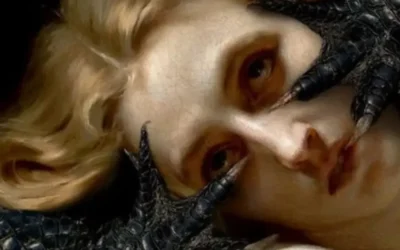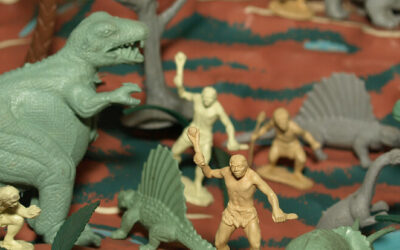A Pioneering Exploration of the Psyche's Hidden Realms In an enthralling podcast episode, psychotherapist and author Alex Monk takes listeners on a captivating journey through the uncharted territories of the human psyche. Drawing upon his trailblazing book "Trauma and the Supernatural in Psychotherapy," Monk introduces a revolutionary framework for understanding the intricate entanglement of relational trauma, unconscious phantasies, and supernatural experiences. His work invites clinicians to venture beyond the...
The “Lost World” of Miyazaki’s Masterpiece
*This review contains spoilers for the film The Boy and the Heron What is The Boy and the Heron trying to tell us? To escape from this depressing situation, they often find themselves wishing they could live in a world of their own - a world they can say is truly theirs, a world unknown even to their parents. To young people, anime is something they incorporate into this private world. I often refer to this feeling as one yearning for a lost world. It's a sense that although you may currently be living in a world...
The Jungian Anima and Animus: How They Show Up in Relationships
How does the anima and animus show up in relationships? The concept of the anima and animus is one of the most enduring and influential ideas to emerge from the work of Swiss psychiatrist Carl Jung. In this post, we'll take a deep dive into the anima/animus theory, exploring its origins, evolution, and practical applications in intimate relationships and family systems. We'll see how Jung's original formulation of the anima/animus was expanded upon by his proteges and successors, and consider criticisms and...
Alvar Aalto: Organic Modernism and the Humanization of Design
Who was Alvar Aalto? Alvar Aalto (1898-1976) was a Finnish architect and designer whose work synthesized modernist ideals with a deep reverence for nature and humanism. Over a career spanning more than five decades, Aalto created a vast body of work that included buildings, furniture, glassware, and textiles, all united by a common vision of organic harmony and human-centered design. From his early experiments in bent wood furniture to his monumental civic centers and churches, Aalto's designs embodied a unique...
Arne Jacobsen: Organic Modernism
Who was Arne Jacobsen? Arne Jacobsen (1902-1971) was a seminal figure in Danish modernist architecture and design. Over a prolific career, Jacobsen created a visionary body of work that fused the clean minimalism of the International Style with a distinctively Scandinavian sense of warmth and humanism. His buildings and furnishings exemplified a philosophy of "organic modernism," embracing the latest technologies and materials while remaining grounded in the tactility of nature and the contours of the human body....
Charles Eames: Pioneering Designer of the Modern Era
Who were Charles and Ray Eames? Charles Eames (1907-1978) was a pioneering American designer whose groundbreaking work in furniture, architecture, and film helped define the aesthetic of postwar modernism. In partnership with his wife and creative collaborator Ray Eames, Charles developed a design philosophy centered on the belief that good design should be accessible to all. From their iconic molded plywood chairs to their experimental Case Study Houses, the Eameses' work embodied the optimism and innovation of...
Ludwig Mies van der Rohe: Architect of the Modern Age
Who was Ludwig Mies van der Rohe? Ludwig Mies van der Rohe (1886-1969) was a towering figure in the history of modern architecture, whose influence continues to shape the built environment well into the 21st century. Over a career spanning more than half a century, Mies developed a distinctive vision of structural clarity and spatial poetry that redefined the very language of building. From his early experiments in European modernism to his iconic American skyscrapers, Mies pursued an architecture of essential...
Niels O. Möller: Master of Danish Modern Chair Design
Who was Niels Moller? Early Life and Training Niels Otto Möller was born in 1920 in Aarhus, Denmark. The son of a shoe manufacturer, Möller developed an appreciation for craftsmanship and materials from an early age. As a young man, he trained as a cabinetmaker before studying at the prestigious Danish School of Arts and Crafts in Copenhagen. After completing his education in 1944, Möller returned to Aarhus and opened his own workshop and design studio. There he began experimenting with chair designs, honing the...
Hans J. Wegner: The Master of Chairs and teh Danish Modern
Hans J. Wegner: Archetypes of Danish Chair Design Hans J. Wegner (1914-2007) was a pioneering Danish furniture designer whose work helped define the aesthetic of mid-century modern design. Over a prolific career spanning nearly seven decades, Wegner crafted a stunning array of chairs that married the sleek functionality of modernism with the warmth and organic sensibility of natural materials. His designs, at once timeless and utterly original, gave expression to the deepest principles of form and craftsmanship....
Was Freud Wrong About Sexuality?
Evolution, the Divided Brain, and the Complexity of the Human Psyche Sigmund Freud, the father of psychoanalysis, is famous (or perhaps infamous) for his controversial theories that placed sexuality at the very center of the human psyche. He argued that sexual instincts and impulses, emerging from the unconscious id, were the primary drivers of human behavior, motivation, personality development, and even mental illness. But was Freud wrong about the primacy of sexuality? Insights from evolutionary psychology,...










